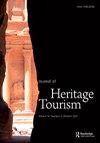Heritage tourism products based on traditional nature-related knowledge: assessment of cultural, social, and environmental factors in cases from rural Austria
IF 2.2
Q2 HOSPITALITY, LEISURE, SPORT & TOURISM
引用次数: 4
Abstract
ABSTRACT We investigate success and sustainability factors for tourism offers based on intangible cultural heritage, such as traditional nature-related knowledge and practices, and propose an assessment framework for communities. Using examples from rural Austria, where such practices serve as tourism attractions in many communities, we demonstrate how ‘packaging’ knowledge and practices into tourism offers can contribute to sustainable tourism development with shared benefits in rural areas away from well-known tourism centres and attractions. Such activities also contribute to safeguarding and revitalisation of intangible cultural heritage and cultural landscapes in a sustainable manner, balancing entertainment, and educational/cultural values. Using a social constructionist frame and ethnographic case study approach, data from interviews with 19 stakeholders from four regions, selected through purposive sampling, were analysed and their experiences and perceptions were complemented by participant observations. Results of the thematic data analysis were categorised into different groups of sustainability and success factors building the assessment framework for tourism potential. We discuss factors such as mechanisms of stakeholder engagement and benefit sharing, and characteristics of good cultural interpretation and tourism experience by analysing good practices and flaws of the four case studies and provide recommendations for using the assessment framework in practice.基于传统自然相关知识的遗产旅游产品:奥地利乡村案例中文化、社会和环境因素的评估
摘要:我们调查了基于非物质文化遗产的旅游产品的成功和可持续性因素,如传统的自然相关知识和实践,并提出了一个社区评估框架。我们以奥地利农村为例,展示了将知识和实践“包装”到旅游产品中,如何有助于可持续旅游发展,并在远离知名旅游中心和景点的农村地区分享利益。这些活动也有助于以可持续的方式保护和振兴非物质文化遗产和文化景观,平衡娱乐和教育/文化价值。采用社会建构主义框架和人种学案例研究方法,对来自四个地区的19名利益相关者的访谈数据进行了分析,这些数据是通过有目的的抽样选出的,参与者的观察补充了他们的经验和看法。专题数据分析的结果被分为不同的可持续性和成功因素组,建立了旅游潜力评估框架。我们通过分析四个案例研究的良好做法和缺陷,讨论了利益相关者参与和利益共享机制、良好文化解读和旅游体验的特点等因素,并为在实践中使用评估框架提供了建议。
本文章由计算机程序翻译,如有差异,请以英文原文为准。
求助全文
约1分钟内获得全文
求助全文
来源期刊

Journal of Heritage Tourism
HOSPITALITY, LEISURE, SPORT & TOURISM-
CiteScore
6.50
自引率
11.10%
发文量
39
期刊介绍:
The Journal of Heritage Tourism ( JHT ) is a peer-reviewed, international transdisciplinary journal. JHT focuses on exploring the many facets of one of the most notable and widespread types of tourism. Heritage tourism is among the very oldest forms of travel. Activities such as visits to sites of historical importance, including built environments and urban areas, rural and agricultural landscapes, natural regions, locations where historic events occurred and places where interesting and significant living cultures dominate are all forms of heritage tourism. As such, this form of tourism dominates the industry in many parts of the world and involves millions of people. During the past 20 years, the study of tourism has become highly fragmented and specialised into various theme areas, or concentrations. Within this context, heritage tourism is one of the most commonly investigated forms of tourism, and hundreds of scholars and industry workers are involved in researching its dynamics and concepts. This academic attention has resulted in the publication of hundreds of refereed articles in various scholarly media, yet, until now there has been no journal devoted specifically to heritage tourism; Journal of Heritage Tourism was launched to fill this gap. JHT seeks to critically examine all aspects of heritage tourism. Some of the topics to be explored within the context of heritage tourism will include colonial heritage, commodification, interpretation, urban renewal, religious tourism, genealogy, patriotism, nostalgia, folklore, power, funding, contested heritage, historic sites, identity, industrial heritage, marketing, conservation, ethnicity, education and indigenous heritage.
 求助内容:
求助内容: 应助结果提醒方式:
应助结果提醒方式:


